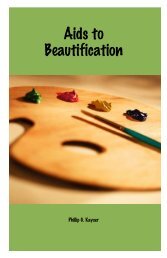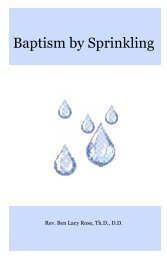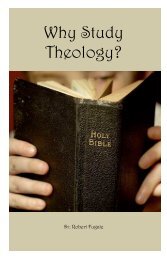"Has God Indeed Said?" - Biblical Blueprints
"Has God Indeed Said?" - Biblical Blueprints
"Has God Indeed Said?" - Biblical Blueprints
Create successful ePaper yourself
Turn your PDF publications into a flip-book with our unique Google optimized e-Paper software.
34 • <strong>Has</strong> <strong>God</strong> <strong>Indeed</strong> <strong>Said</strong>?<br />
around 180, was bound to be influenced by the scholars of the<br />
great library in that city.<br />
To the extent that the roots of the allegorical approach to<br />
biblical interpretation that flourished in Alexandria during the<br />
third century were already present, they would also be a negative<br />
factor. Since Philo of Alexandria was at the height of his<br />
influence when the first Christians arrived there, it may be that<br />
his allegorical interpretations of the Old Testament began to rub<br />
off on the young church already in the first century. A literalist is<br />
obliged to be concerned about the precise wording of the text<br />
since his interpretation or exegesis hinges upon it. Since an<br />
allegorist is going to impose his own ideas on the text anyway,<br />
he would presumably have fewer inhibitions about altering it.<br />
How about proficiency in Greek? The use of Greek in Egypt<br />
was already declining by the beginning of the Christian era. To<br />
what extent was it the mother tongue of the bulk of the<br />
population? By the third century the decline was evidently well<br />
advanced. I have already argued that the copyist who did p66 (c.<br />
200) did not know Greek. Now consider the case of p75 (c. 220).<br />
E.C. Colwell analyzed p75 and found about 145 itacisms plus<br />
257 other singular readings, 25% of which are nonsensical. From<br />
the pattern of mistakes it is clear that the copyist who did p75<br />
copied letter by letter. This means that he did not know Greek --<br />
when transcribing in a language you know, you copy phrase by<br />
phrase, or at least word by word. Before 200 the tide had begun<br />
to turn against the use of Greek in the areas that spoke Latin,<br />
Syriac, or Coptic, and fifty years later the changeover to the local<br />
languages was well advanced.<br />
By the fourth century the level of proficiency in Greek to be<br />
found in Egypt must have been seriously reduced, yet it<br />
produced the two most important witnesses usually attributed to<br />
the Alexandrian text-type. The parchment codices B (Vaticanus)<br />
and Aleph (Sinaiticus) are assigned to the fourth century and are<br />
generally understood to have been produced in Egypt. In the<br />
Gospels alone these two MSS differ well over 3,000 times,<br />
which number does not include minor errors such as spelling,<br />
nor even variants between certain synonyms. Now then, simple






